
By: Elliott Gabriel
http://www.telesurtv.net/english/opinion/Punisher-or-Powerless-Philippine-Revolutionary-Left-Rates-Dutertes-First-Year-20170629-0023.html
Published 29 June 2017 (6 hours 29 minutes ago)
teleSUR spoke to prominent leaders of the Philippine revolutionary mass movement to assess their attitudes toward Duterte after his first year.
June 30 marks one year since Rodrigo Roa Duterte was sworn in as the 16th President of the Republic of the Philippines. Promising a tough approach to the crime and corruption that’s plagued the archipelago while speaking in a brusque and unvarnished manner peppered with idioms and curse words, the Mindanaoan lawyer was quickly branded the “Filipino Trump” by foreign media outlets. The sensationalist comparison does little justice to the complexities of Philippine politics.
Unlike celebrity-turned-President Donald Trump, Duterte had extensive political experience as the mayor of Davao for over two decades, where he earned a reputation not only for leading the “Davao Death Squad” but also for his deliberative and sympathetic attitude toward left-wing and progressive movements representing agrarian and urban poor people, laborers, and LGBTQ communities as well as women.
During his presidency, Duterte spoke emphatically of charting an independent foreign policy course, breaking from over a century of United States domination and opting for a closer strategic relationship with superpower neighbors China and Russia.
Additionally, Duterte ruffled feathers by promising to end the “pork barrel” scams plaguing Malacañang, confronting the all-powerful oligarchs and conglomerates who have long dominated the politics, military affairs and economy of the export-oriented and the import-dependent Philippines.
Most ambitiously, before arriving in office Duterte pledged the resumption of long-stalled formal negotiations between the Philippines and the National Democratic Front for the Philippines — the revolutionary front encompassing various mass organizations — which is also representing the clandestine Communist Party of the Philippines and the New People’s Army in negotiations. As a sign of good faith, Duterte even invited legislators affiliated with the revolutionary alliance into his cabinet.
However, Duterte proved to be a volatile head of state prone to bluster and erratic policy moves. Profanity-laced denunciations of the Barack Obama administration notwithstanding, Duterte accomplished precious little in terms of breaking from the neocolonial grip U.S. imperialism enjoys over the Philippines, flying back into Washington’s embrace when the Maute group’s siege of Marawi began in May.
Likewise, his promises to negotiate a transition from Asia’s longest communist insurgency toward new human rights agreements, comprehensive socioeconomic reforms, and a federal republic have gone unmet due to miscalculations, bluster and threats, Most infamously, Duterte’s promises to end drug crime have only resulted in a campaign of extrajudicial killings waged on petty criminals with little means and drug addictions rather than wealthy drug kingpins. In May, the politician who once shouted “Allahu Akbar” to Moro crowds made good on imposing the martial law he pontificated often about in public appearances, advising Armed Forces of the Philippines personnel to indiscriminately use force in Muslim Marawi regardless of civilian deaths while even making repugnant “jokes” about military gang-rapes of civilians.
So, is “Rowdy Rody” unfolding to be a case of “all blow and no show” or are there some real accomplishments hidden amid the scandal? Is the “Punisher” the ruthless strongman he’s made out to be or is he a frail figurehead constrained by the obligations of his office – or is he simultaneously both?
To get a better understanding of Duterte’s first year in office, teleSUR spoke to prominent representatives and mass movement leaders from the Philippine Left to get their assessment of Duterte’s first year in office.
Joining us in conversation:
Jose Maria “Joma” Sison (ILPS), Exiled Communist Party of the Philippines founder and chief political consultant to the National Democratic Front of the Philippines
Elmer “Ka Bong” Labog (KMU), Chairperson of the May First Labor Movement, Kilusang Mayo Uno
Danilo “Ka Daning” Ramos (UMA), Secretary-general of the Federation of Agricultural Workers, UMA Pilipinas
Sarah Katrina Maramag (MIGRANTE), International executive committee member of Migrante International, an alliance of overseas Filipino organizations and overseas foreign workers (OFWs)
Cristina “Tinay” Palabay (KARAPATAN), Secretary-general of human rights alliance KARAPATAN, the Alliance for the Advancement of People’s Rights
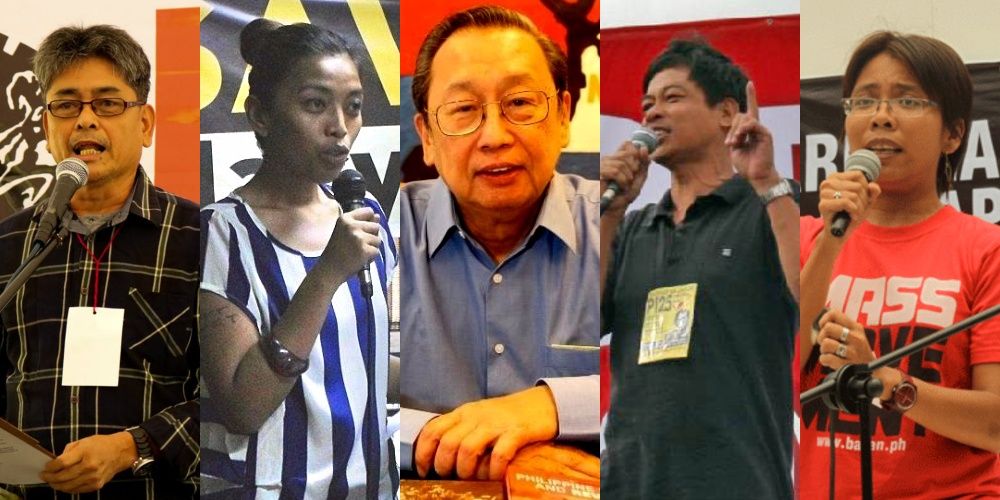
Has Duterte been responsive to the demands of mass movements, workers and the left?
Sison (ILPS): Within the past year, Duterte said that he wished to become the first Left president of the Philippines and described himself as a socialist. He offered to release all political prisoners listed by the NDFP in conjunction with a comprehensive agreement on social and economic reforms. He also offered to the Communist Party of the Philippines four major posts in his cabinet. But I advised him to offer the posts to legal personalities who were progressive but not necessarily communists, pending the success of GRP-NDFP peace negotiations. He released only 19 out of 400 political prisoners in August last year.
He welcomed to the presidential palace patriotic and progressive mass activists who urged him to adopt the people’s agenda for basic social, economic, political and constitutional reforms. He appointed a number of progressives to his cabinet but they are a minority and are far outnumbered by the rightist exponents of the neoliberal economic policy and the security policy of the U.S. He could give concessions to the workers and peasants so long as they were making demands against oligarchs who are not on speaking terms with him.
However, since February this year, after three successful rounds of formal talks, Duterte has proclaimed a policy of all-out war against the revolutionary forces represented by the NDFP in the peace negotiations. He started to badmouth and insult them and threaten them with aerial bombardments and artillery fire. He expressed impatience over failing to get a bilateral cease-fire agreement that would amount to the capitulation and pacification of the revolutionary forces. He backed out of his promise to release all political prisoners.
This turn of events has made the revolutionary forces and people concerned that he is on the path of suppressing the revolutionary movement by whatever means, including the use of mass murder against the poor as in his supposed war on illegal drugs.
Labog, KMU: President Duterte falls short … in heeding Filipino workers’ and people’s demands and even in delivering his own promises and pronouncements.
Duterte’s promise of “change” has not come in his first year in power. U.S. imperialists, local big business compradors and landlord oligarchs continue to dominate the semi-colonial and semifeudal Philippine society. Poverty, hunger and injustice continue to worsen among Filipino workers and people.
Ramos, UMA: Duterte initially displayed promising efforts for agricultural workers and other working people, the most surprising and unprecedented of which is the appointment of an activist, peasant leader Rafael Mariano, to head the Department of Agrarian Reform. Duterte also revoked a few lopsided land reform arrangements in Negros and Mindanao, called agribusiness venture agreements and the stock distribution option scheme or AVAs-SDO, through the Presidential Agrarian Reform Council. Also, it is not every day that a Philippine president invites leftist leaders to literally sit down and talk with him, hours after these same people led big mass mobilizations outside the Palace or Congress.
No president ever went out of his way to visit a farmers’ protest camp-out, as Duterte did with agrarian reform beneficiaries embroiled in a land dispute with Lapanday Corp.
But farmers and agricultural workers have enough reasons to question Duterte’s willingness to implement genuine land reform, especially since so-called “Dutertenomics” or the regime’s overall economic program still subscribes to the imperialist neoliberal framework. He has yet to certify as urgent, the passage of a new land reform law, particularly House Bill 555 or the Genuine Agrarian Reform Bill, to replace the bogus Comprehensive Agrarian Reform Program which expired in 2014. It’s been almost a year since the PARC approved a two-year moratorium on land use conversion, but he has yet to sign an Executive Order to actually implement this.
Has Duterte managed to begin shifting the country toward a more independent foreign policy?
Sison, ILPS: Duterte previously cursed Obama for wishing to lecture him on human rights. He has also expressed resentment over signals from the U.S. Congress that military assistance from the U.S. could be reduced if he does not comply with human rights standards in relation to the thousands of victims of extrajudicial killings in his so-called war on illegal drugs.
Thus, he has made approaches to both China and Russia for economic and military cooperation. In this regard, it may be said that he has managed to begin shifting the Philippines from being a neocolony exclusive to U.S. hegemony. But it may also be said that he is trying to make a bit more room to maneuver without having to reduce the overwhelming extent of U.S. hegemony over the Philippines and without having to be assertive of national sovereignty and territorial integrity.
At this point in time, it can be said that he is at the crossroads and he is manifesting extreme dependence on U.S. military intervention and on pro-U.S. Filipino military officers and men. Contrary to his usual bravado vis-à-vis the U.S., he acknowledges mortal fear of a possible assassination or coup from the direction of the CIA. He appears shaken by the attack on Marawi by the Maute and Abu Sayyaf groups which are affiliated to the CIA-directed Islamic State (Daesh).
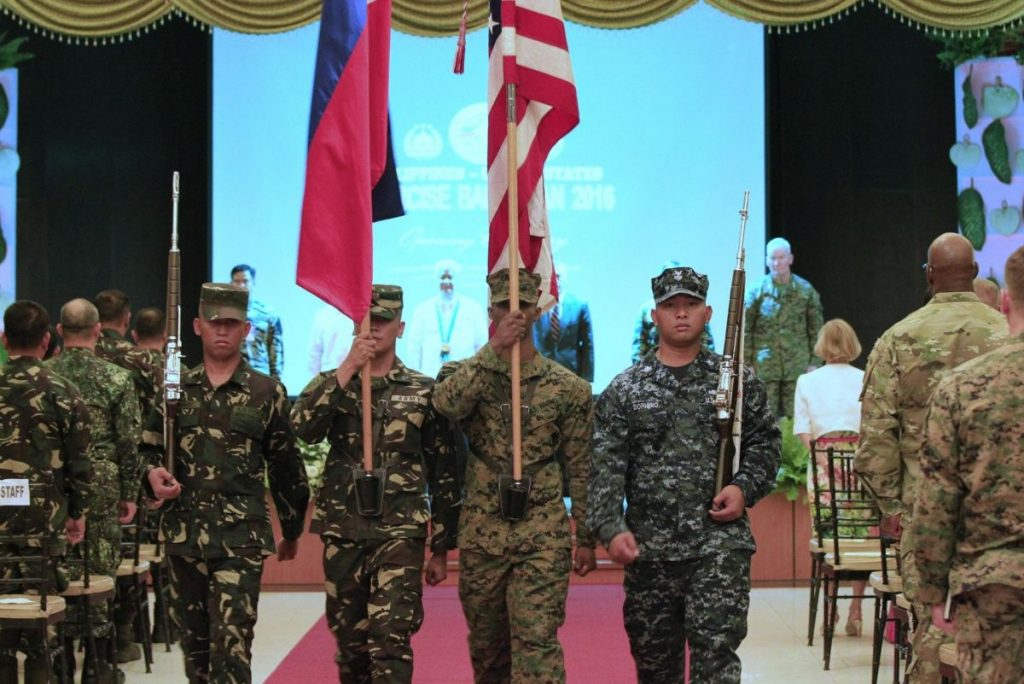
Labog, KMU: Duterte has surrounded himself with U.S. lackeys and henchmen in his cabinet. They have been the primary instigators of U.S.-dictated economic and military policies that viciously attacks the Filipino people’s aspirations for social justice, national development, genuine freedom and democracy and for a just and lasting peace.
The administration’s economic policies remain subservient to the U.S.’s neoliberal dogma of liberalization, privatization deregulation, and denationalization. The Filipino people demanded that Duterte veer away from the decades of neoliberal oppression by adopting genuine land reform and national industrialization as his national economic development policy. However, Duterte himself has openly rejected this demand by saying, “why fix what is not broken?”
Duterte’s efforts towards resuming the peace talks with the National Democratic Front of the Philippines is seen as a positive response towards Filipino workers’ and people’s demands for a just and lasting peace and addressing the worsening poverty hunger and injustice which are the roots of armed conflict in the country. However, Duterte has been allowing U.S. henchmen and warmongers in his defense cluster to sabotage the generally progressing peace talks.
By coddling these pro-U.S. warmongers and fascists in his cabinet in fear of being destabilized by his own military, Duterte gave license to the U.S.’s full control over the country’s political and military affairs. His martial law declaration, upon the recommendation of his defense cluster, has paved the way for a U.S.-backed state terrorism against Filipino workers and people not only in Mindanao but in the entire country as well.
Maramag, MIGRANTE: Despite his pronouncements and posturing, quite the contrary. With regard to foreign policies and relations affecting our OFWs (overseas foreign workers) and Filipinos overseas, President Duterte’s statement that he “will not lift a finger” to help the almost one million undocumented Filipino e/migrants in the U.S. under threat of mass deportation due to President Trump’s anti-migrant program is very telling of his overall attitude and policy.
According to the Department of Foreign Affairs, there are currently 3.4 million Filipinos in the U.S., second only to Saudi Arabia in terms of Filipino populace. Of the 3.4 million, close to one million are undocumented and vulnerable to Trump’s repressive crackdown.
It is the Philippine government’s duty to assist Filipinos abroad, regardless of their status. Do we turn our backs on them when they desperately need the help of their government? Should any harm befall them in the U.S., Duterte will be to blame if he continues to tolerate and support Trump’s neofascism.
The Duterte government’s position calling on all undocumented Filipinos in the U.S. to “just come home” is also a very insensitive stance. Like all other OFWs, they were forced to seek so-called better pastures in the U.S. (or elsewhere in the world) due to widespread joblessness, contractualization and low wages, landlessness and lack of basic social services. Over the years, OFWs in conflict-ridden areas have opted to stay and risk their lives and welfare because they know that no jobs await them in the Philippines.
The plight of OFWs against racism, xenophobia, rights violations and fascism in host countries is also a very important agenda in the GRP-NDFP peace talks. Unfortunately, the Duterte government has withdrawn from the fifth round of formal negotiations.
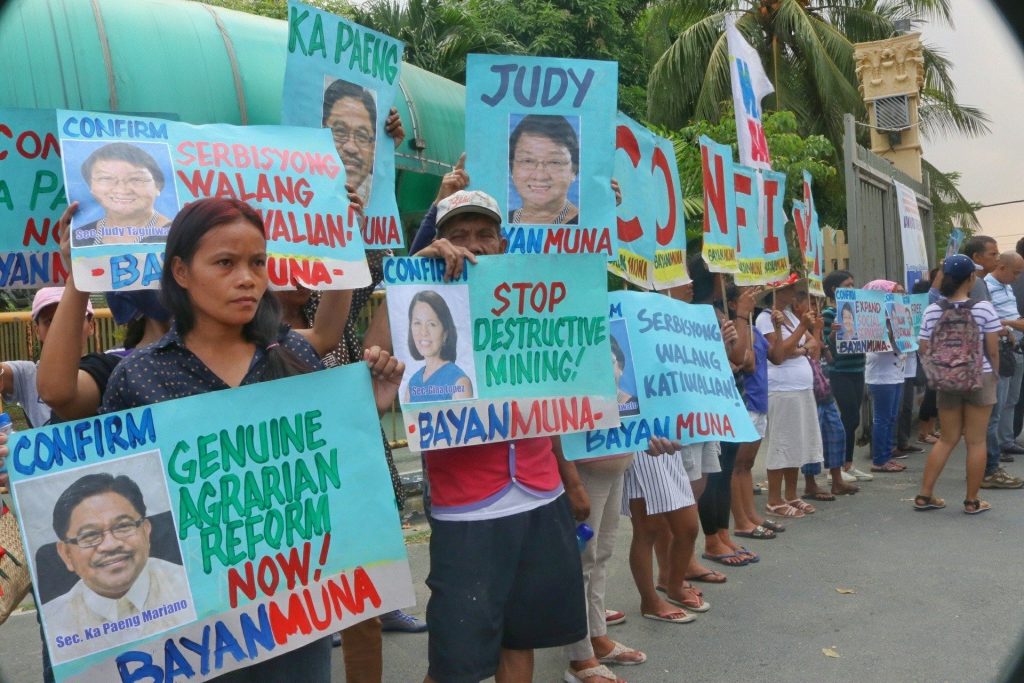
Has Duterte moved to curb the political power of the big oligarchs?
Sison, ILPS: The big oligarch clans in the Philippines enjoy high recognition because they include at the national, regional and provincial levels outstanding politicians and bureaucrats who have increased their political power and wealth by using as their social base or by representing big comprador and landlord interests. They remain intact and flourishing. Duterte has not moved to curb their political power and abuses. So far, he prefers not to rock the ruling system by holding the previous Aquino regime accountable for corruption.
Despite the campaign promise of Duterte to go after the big yellow crooks of Aquino II regime, he has not done so obviously out of fear that they can strike back harder than when they are not touched. During the electoral campaign of 2016, Duterte demagogically denounced the oligarchs in mass meetings but in fact allied himself with such oligarchs of Luzon as the Marcoses, Arroyos, Estradas, Remullas and the like, to get votes from their bailiwicks. Duterte himself belongs to a big oligarch clan which includes the Duranos and Almendrases of the Visayas and Mindanao.
Labog, KMU: As far as the GRP-NDFP peace talks are concerned, Duterte has shown a lack of interest in genuine land reform. Throughout the duration of the talks, Duterte has been constantly insisting on an interim bilateral cease-fire ahead of any agreement on socioeconomic reforms. By doing so, Duterte is sending a signal that he is only after the capitulation and pacification of the revolutionary forces and not in addressing the widespread landlessness and poverty among Filipino peasants who compose 75 percent of the country’s population.
Duterte has also taken no concrete step towards heeding our peasants’ demands for free land distribution. He has remained silent on the continued monopoly of the Cojuangco-Aquino clan over the vast lands of Hacienda Luisita and others amid the 2012 Supreme Court ruling that ordered its distribution to farm-worker beneficiaries.
If not for the militant and collective struggle of the Madaum Agrarian Reform Beneficiaries Association Inc., Duterte would not have been forced to recognize their legitimate and just demand for reinstallation over the agricultural lands of the Lapanday Food Corporation owned by the despotic Lorenzo landlord clan. However, Duterte has shown no concrete support for other legitimate and just peasant struggles to occupy other oligarch owned lands.
Duterte also remains mum on the landlord oligarchs’ move to block the confirmation of Agrarian Reform Secretary Rafael Mariano who has shown unwavering support for Filipino peasants’ struggle for genuine agrarian reform.
Ramos, UMA: As with other positive steps such as the peace talks, and the matter of releasing political prisoners, Duterte himself has many times contradicted his own promises and commitments, while his generals and the most rabid of neoliberal talking heads and oligarchs within his cabinet have no qualms in openly opposing the administration’s supposed pro-people efforts.
Have labor rights and the right to organize improved under Duterte?
Ka Bong, KMU: U.S. imperialism, as its prime instigator, has intensified the neoliberal onslaught against workers’ wages and hard-won rights resulting in the worsening hunger and poverty among Filipino workers.
Duterte’s failure in addressing our workers legitimate and just demands for regular jobs, living wages and respect for labor and human rights and his continued adherence to neoliberal economic policies paved the way to the unabridged attacks against workers’ rights and dignity.
This has been reflected in the International Trade Union Confederation’s 2017 Global Rights Index which cited the Philippines as the fourth worst country in the world for workers’ rights.
Duterte’s promise of ending contractualization remains unfulfilled. Worse, the recently signed Department of Labor and Employment Order 174 even legitimized labor flexibilization through third party labor contracting agencies as a government employment policy thereby depriving a majority of Filipino workers who are now contractuals of their basic rights to regular jobs, to the mandated minimum wage, to unionize, collectively bargain and to strike.
Contractualization, as a flexible labor scheme, subjects workers to the worst forms of labor and human exploitation by removing any employer-employee relationship from which all local and international labor laws are based.
Duterte’s declaration of martial law has also taken its toll on workers’ rights. Foreign and local capitalists, in connivance with fascists in the Duterte administration, are now using the martial law to curtail civil liberties and suppress workers’ legitimate and just struggles.
Layoffs of workers forming unions remain rampant. This has been highlighted by the succeeding strikes and protests against illegal dismissals, union busting and for regularization of workers of Manila Cordage Company-Manco Synthetics Inc. and Philippine Dong Yun Plate Making Corporation in Laguna, Soro-Soro Ibaba Development Cooperative in Batangas, Freshmax Trading Company and Shin-Sun Tropical Fruit Corporation in Compostela Valley among others.
Ramos, UMA: Workers are not satisfied with the government’s new labor order which would supposedly fulfill Duterte’s campaign promise to end contractualization or the rampant ENDO (end of contract) set-up in workplaces. Duterte’s imposition of martial law in the whole of Mindanao island is serious cause for alarm especially for agricultural workers since most agribusiness plantations are located on the island.
Labor rights have been blatantly violated by military forces, as in the case of the violent strike dispersal and arrest of Shin Shun workers in Compostela Valley on June 2 (see above video), and the detention of UMA Spokesperson Lito Lao and three other peasant leaders and human rights activists at a military checkpoint, which happened just on Wednesday, June 28.
These atrocities can now be argued as “legal” under military rule since the writ of habeas corpus is also suspended.
Maramag, MIGRANTE: So far, there are no indications that the Duterte government’s thrust will veer away from implementing a labor export policy that is dependent on the export Filipinos’ cheap labor in exchange for remittances.
Widespread unemployment, contractualization and lack of basic social services are the root causes of forced migration — something that President Duterte promised to “make optional and not a necessity” when he assumed office.
President Duterte’s earlier promise to end contractualization by the end of 2016 was widely welcomed even by OFWs because it brought hope of coming home to decent-paying regular jobs. However, this promise is yet to be fulfilled. In light of the continuing crisis in the Middle East and looming mass deportations of undocumented migrants in the U.S. and Europe, OFWs are expected to return to the country only to be forcibly driven away again to seek jobs despite risky conditions abroad.
The situation of OFWs has undeniably worsened since the neoliberal policy of labor export came into full force.
Policy-wise, the Duterte government has so far done nothing substantial to curb forced migration or to deviate from a policy of labor export. The Philippine economy’s dependence on remittances from OFWs remains unparalleled to this day.
OFWs are coming back home in droves not because they choose to, but because of the effects of an ongoing global economic crisis in host countries. Hundreds of thousands of OFWs are being displaced and retrenched in Saudi Arabia and the Middle East. What awaits them in the event of their emergency return? There are definitely not enough decent-paying domestic jobs available. What the Duterte government offers are mere dole-outs and band-aid solutions that are not long-term solutions to unemployment, low wages and lack of social services.
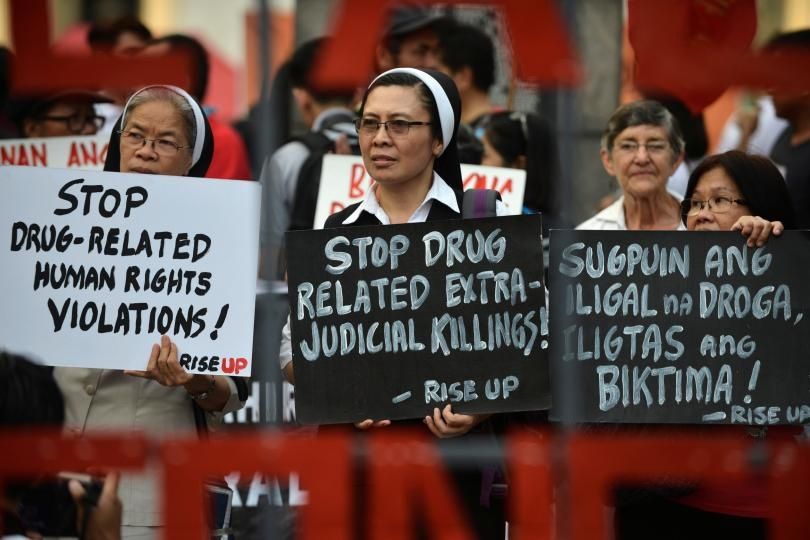
How has the human rights situation improved or deteriorated?
Sison, ILPS: The Duterte regime has been escalating military operations against the revolutionary forces and communities. These operations have involved arbitrary arrests, torture, murder, looting, land grabbing, bombardments and forced evacuations.
Ramos, UMA: Militarism and rampant rights violations under Duterte’s bloody drug war and counter-insurgency program Oplan Kapayapaan target the poor.
Palabay, KARAPATAN: Human rights violations have been committed with graver impunity especially with the continuing implementation of the U.S.-driven counterinsurgency program, all-out war declaration against the people, the anti-poor war on drugs and martial law declaration in Mindanao.
Additionally, a link to a comprehensive report by Karapatan on human rights released Thursday was given to teleSUR, from which the following paragraph is excerpted.)
“A year into the Duterte administration, we are faced with greater challenges. Fascist attacks on people’s rights brought about by increasingly militarist policies of Pres. Duterte, the Armed Forces of the Philippines, Philippine National Police and the United States government have plagued the country, violating the Government of the Republic of the Philippines’ own laws and signed peace agreements, as well as international human rights instruments. Initial optimism on his promises and pronouncements to release political prisoners, to seriously address the roots of the armed conflict through the resumption of the formal peace talks with the National Democratic Front of the Philippines and Moro revolutionary groups, and to pull out U.S. troops in Mindanao were dampened by the cases of extrajudicial killings in line with the war on drugs and the continuing counter-insurgency program, the intensified militarization of communities through all-out war, the imposition of martial law in Mindanao and the non-reversal of economic policies that continue to benefit landlords, oligarchs and imperialists. The spate of extrajudicial killings, in line with Duterte’s war on drugs, that started even before he assumed his presidency has escalated to an unprecedented number in the succeeding weeks and months, earning national and international condemnation.”
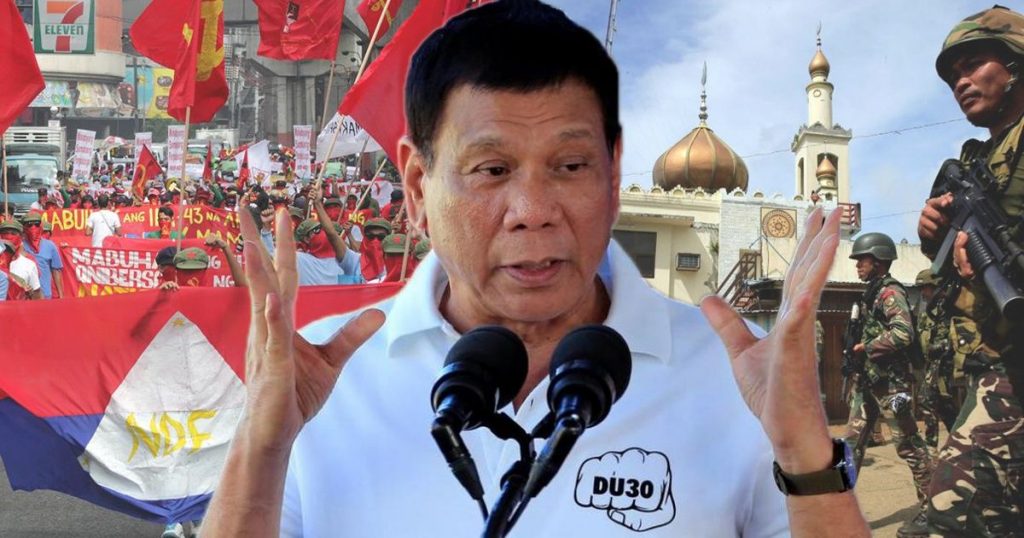
What future under Duterte?
Labog, KMU: There remains a challenge to Duterte to immediately sign the Executive Order to end all forms of contractualization submitted to him by the KMU as a result of the Labor Day dialogue which was held as the government’s response to the 100,000-strong labor day protests last May 1, 2017. Also as a result of the dialogue, the DOLE (Department of Labor and Employment) has started the process of deputizing unionists as labor standards inspectors who will be given license to look into capitalists’ violations on labor and occupational safety and health standards, including the practice of “illegal” contractualization schemes.
Ramos, UMA: One year into Duterte’s reign, his ability to steer the nation towards real progress or the “change” he has promised is fraught with serious questions.
Maramag, MIGRANTE: It will be a never-ending cycle unless President Duterte makes good his promise to address the root causes of forced migration. Unemployment, low wages, contractualization, landlessness, and poor social services have been driving our OFWs away. If the president sincerely wants our OFWs to come back home, we need more regular jobs, higher wages and pro-labor policies, not a labor export policy that has long gone bankrupt.
To genuinely address the problem of forced migration, economic policies should focus on developing the national economy by advancing local industries, agriculture and basic services. Migrante International fully supports the call and struggle for national industrialization and genuine land reform as the ultimate solution to the problem of forced migration.
Sison, ILPS: Duterte has failed to fulfill his promises of ridding the country of illegal drugs, common criminality and corruption. And he has paid no attention to the far bigger problems of foreign monopoly capitalism, domestic feudalism and bureaucrat capitalism which have perpetuated economic underdevelopment, widespread poverty, mass unemployment, low incomes, rising prices of basic commodities, inadequate social services and deteriorating public utilities.
The rotten semifeudal ruling system is in a chronic crisis that is ever worsening, especially because the world capitalist system is in the throes of an ever-worsening crisis. Duterte can invoke the crisis to engage in serious peace negotiations with the revolutionary movement and make comprehensive agreements on social, economic, political and constitutional reforms to solve the root causes of the civil war or he gives free reign to his violent inclinations and takes the path of fascism to keep himself in power through brute force